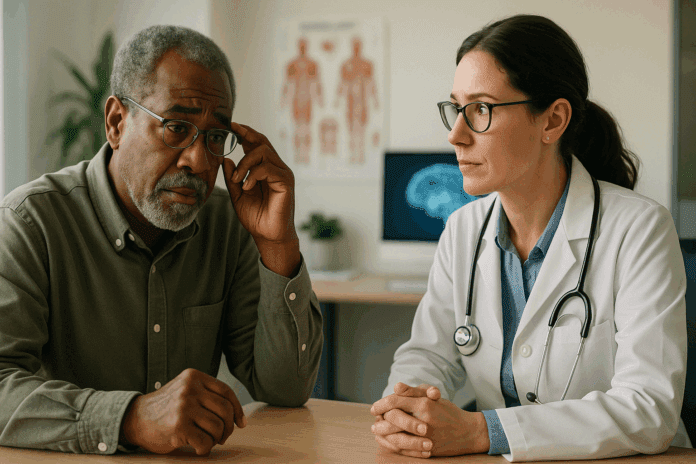Understanding who diagnoses dementia and how the process works is crucial not only for those experiencing memory changes but also for family members who are concerned about a loved one’s cognitive health. Dementia is not a single disease but rather an umbrella term that encompasses a range of conditions associated with a decline in memory, reasoning, or other thinking skills. The diagnosis can be complex, as its symptoms often overlap with those of other conditions. For this reason, obtaining a timely and accurate dementia diagnosis requires consultation with the appropriate medical professionals, a thorough assessment, and a commitment to follow-up care. Recognizing early signs and knowing what kind of doctor treats dementia can significantly influence outcomes, especially since some types of dementia can be managed more effectively if caught early. In this article, we explore how to get a dementia diagnosis, what doctors are involved in the process, and what to expect throughout this journey.
You may also like: How to Prevent Dementia and Alzheimer’s Disease Naturally: Expert-Backed Strategies to Reduce Your Risk Through Lifestyle and Diet
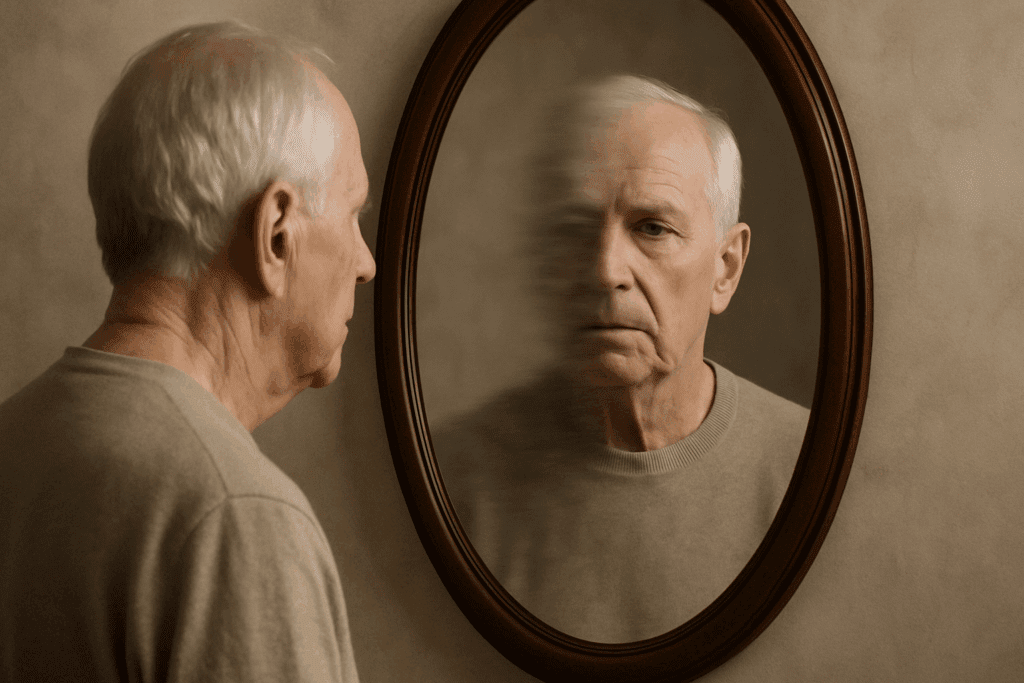
The Importance of Early Recognition and Evaluation
When it comes to neurocognitive decline, timing matters. The earlier dementia is identified, the more likely it is that patients can benefit from early interventions, lifestyle changes, and treatment options that may slow progression. Yet many people remain unsure about how to detect dementia in its early stages or how to begin the diagnostic process. Memory lapses, confusion, and personality changes can be mistakenly attributed to normal aging, stress, or other health issues. Knowing how to diagnose dementia early helps families seek care before irreversible damage occurs.
Another key point is that dementia symptoms vary widely, not only in severity but also in how they present. For instance, some individuals may show subtle changes in executive functioning, while others struggle with spatial awareness or word-finding difficulties. Because of this variability, determining who can diagnose dementia becomes a matter of both professional specialization and clinical insight. The evaluation often begins with a primary care physician but may require the involvement of specialists, such as a neurologist, depending on the complexity of the case.
Who Can Diagnose Dementia? The Role of Primary Care Physicians
The journey toward a dementia diagnosis usually starts in the primary care setting. A general practitioner or family physician is often the first healthcare professional to assess concerns raised by the patient or family. These doctors are trained to conduct initial cognitive screenings and recognize red flags that may suggest a deeper issue. However, while a primary care provider can begin the diagnostic process, they may not always have the tools or expertise to confirm the specific type of dementia.
Understanding how to get a dementia diagnosis begins with an appreciation for the role of these frontline healthcare workers. They take a medical history, evaluate current symptoms, and may administer basic cognitive assessments such as the Mini-Mental State Examination (MMSE) or the Montreal Cognitive Assessment (MoCA). These tools help identify whether further evaluation is warranted. If results are suggestive of cognitive decline, the primary care doctor may refer the patient to a dementia doctor with specialized training for a more comprehensive evaluation.
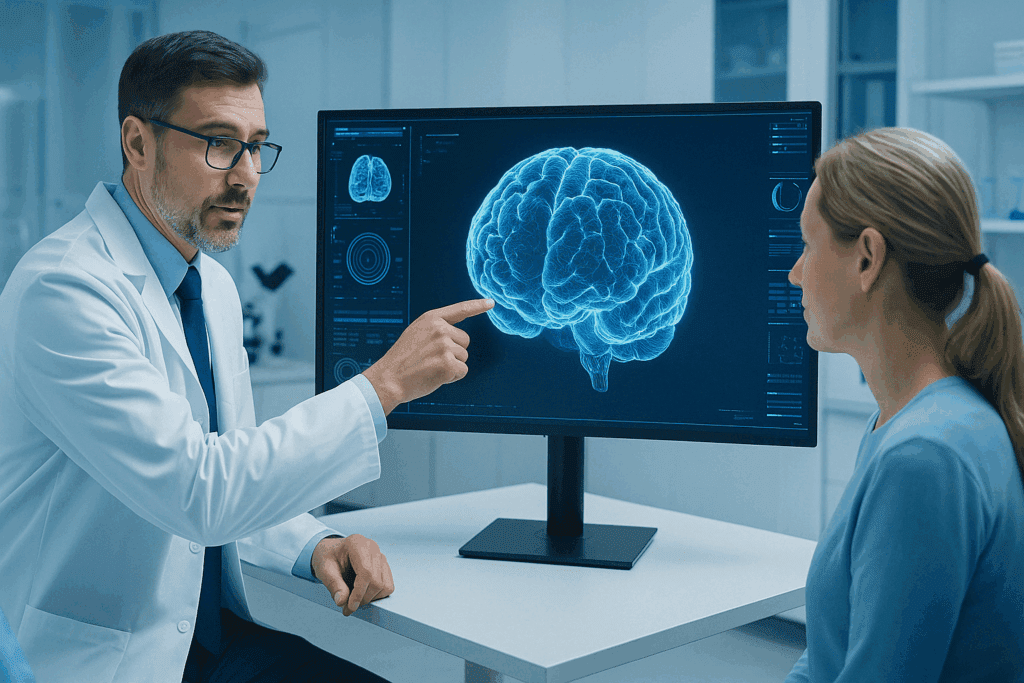
Neurologists and Dementia: Specialized Expertise in Cognitive Disorders
Among the most frequently consulted specialists in dementia care are neurologists. These physicians focus on disorders of the nervous system, including the brain, spinal cord, and peripheral nerves. The involvement of a neurologist and dementia-specific diagnostic tools becomes essential when symptoms are complex, progressive, or indicative of neurodegenerative disease. Neurologists are considered one of the top experts in how to diagnose dementia accurately, using a combination of neurological exams, brain imaging, and cognitive testing.
When exploring what type of doctor treats dementia most effectively, neurologists often top the list due to their familiarity with diseases such as Alzheimer’s, Lewy body dementia, frontotemporal dementia, and vascular dementia. Through advanced neuroimaging techniques like MRI and CT scans, as well as blood work and lumbar punctures when needed, neurologists can rule out other causes of cognitive impairment such as tumors, strokes, or vitamin deficiencies. Their training equips them to differentiate between types of dementia and assess the progression and prognosis of the disease.
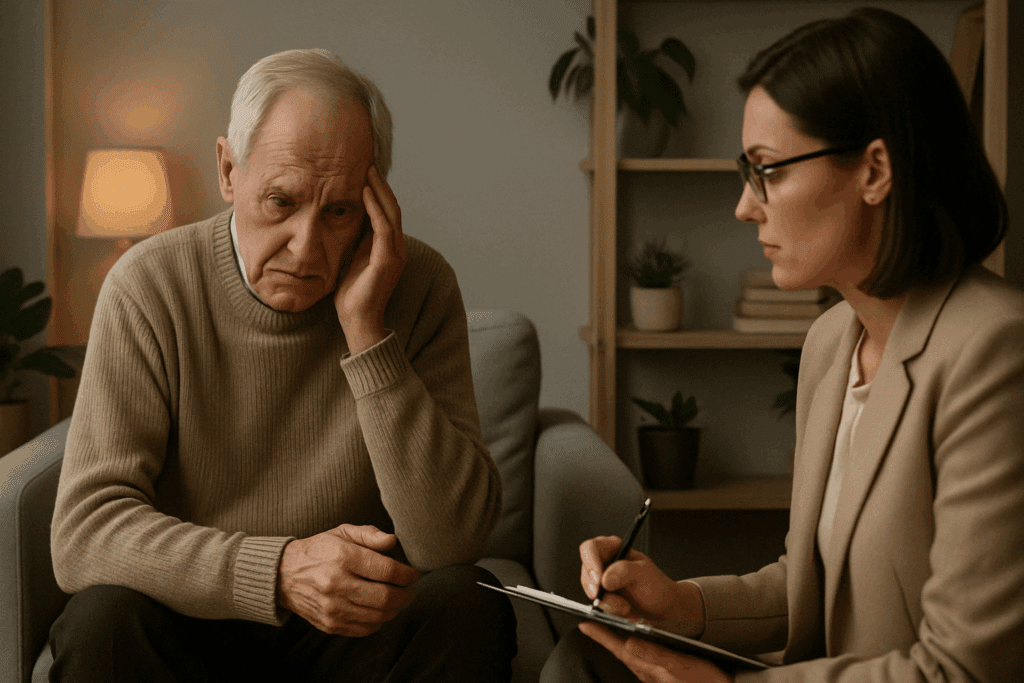
Psychiatrists and Geriatric Psychiatrists: Addressing Behavioral and Emotional Dimensions
While neurologists focus on brain function from a structural and biochemical perspective, psychiatrists, particularly geriatric psychiatrists, bring expertise in the behavioral and emotional symptoms that frequently accompany dementia. These professionals can be crucial when determining how to diagnose dementia in individuals presenting with mood disorders, delusions, or significant personality shifts. Depression, for example, can mimic dementia, particularly in older adults, making accurate diagnosis critical.
Geriatric psychiatrists are trained to assess complex cognitive and emotional presentations, often working in tandem with other specialists to provide a holistic view of the patient. When families ask what doctor diagnoses dementia in cases involving aggression, paranoia, or hallucinations, the answer may well be a geriatric psychiatrist. Their role is especially important in distinguishing between dementia and other psychiatric conditions that may produce similar symptoms. By incorporating mental status exams, psychological assessments, and pharmacologic evaluation, they help round out the diagnostic picture.
Geriatricians: Whole-Person Care for Aging Populations
Geriatricians specialize in the care of older adults and often provide comprehensive management for patients with multiple comorbidities, including cognitive decline. These doctors are particularly well-suited to determine how is dementia diagnosed in the elderly, as they understand the nuances of aging and how various conditions interact. A geriatrician may be the central figure in care coordination, ensuring that patients receive support across medical, social, and functional domains.
Their ability to recognize atypical presentations in elderly populations means they often spot cognitive decline that others might miss. Because geriatricians take a whole-person approach, they assess not only cognition but also physical functioning, social circumstances, and quality of life. When someone asks, how do you get diagnosed with dementia when multiple health issues are involved, a geriatrician may be the ideal provider to initiate or oversee the process.

Neuropsychologists: Deep Cognitive Assessment and Diagnostic Clarity
For individuals experiencing subtle cognitive issues or those seeking clarity on the type and extent of impairment, neuropsychologists play a pivotal role. These professionals specialize in understanding how brain function relates to behavior and cognition. While not medical doctors, they work closely with neurologists and other specialists to provide in-depth evaluations that are central to determining how to diagnose dementia accurately.
A neuropsychological assessment involves several hours of testing that examines memory, attention, language, problem-solving, and visuospatial skills. The resulting data helps create a detailed cognitive profile, which is instrumental in distinguishing between types of dementia and tracking changes over time. If a family is wondering how to detect dementia when early signs are ambiguous or minimal, referral to a neuropsychologist can provide the needed insight.
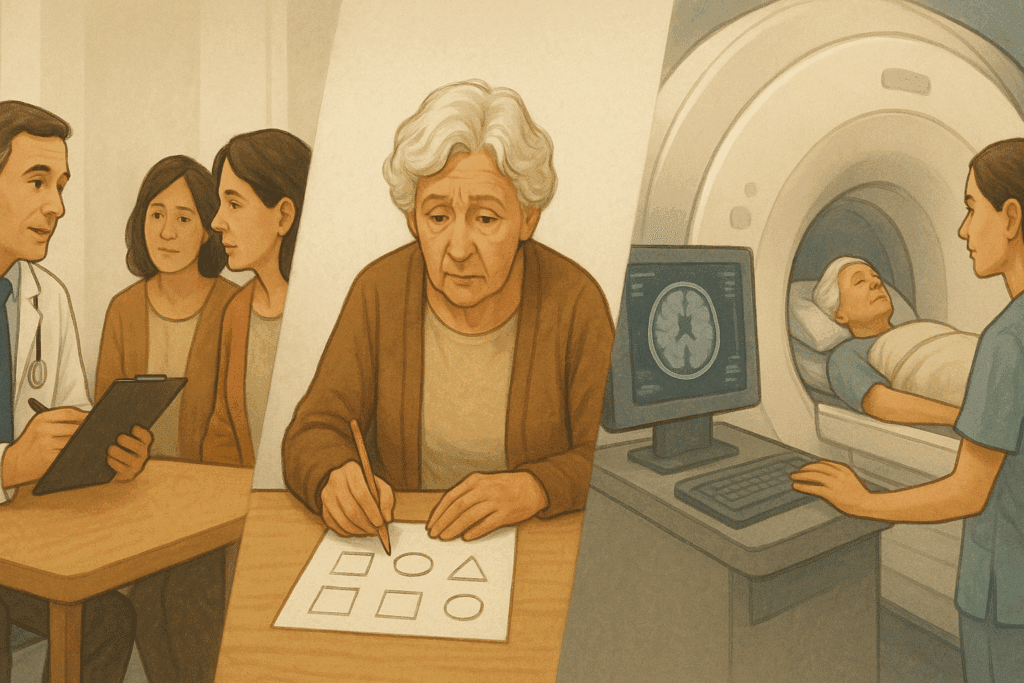
The Diagnostic Process: What to Expect
Obtaining a proper dementia diagnosis involves multiple steps, beginning with history-taking and screening and often progressing to advanced testing and multidisciplinary evaluations. Initial conversations often include both the patient and family members, as collateral information is essential to paint a full picture of the symptoms and their evolution. Clinicians will ask about functional abilities, changes in mood or behavior, and daily routines.
From there, cognitive screening tests may be administered. If results are suggestive of impairment, imaging studies like MRI or CT scans are typically ordered to rule out structural abnormalities. Blood tests are also common, checking for issues such as thyroid dysfunction, infections, or vitamin B12 deficiency. When results remain inconclusive or point to a complex picture, referral to a neurologist, neuropsychologist, or geriatric psychiatrist helps refine the diagnosis.
Understanding how do u diagnose dementia means recognizing that it is rarely the result of a single test. Rather, it is a process of gathering clinical evidence, observing patterns over time, and integrating information from various domains of health. Patients should be prepared for an ongoing relationship with healthcare providers and for the possibility of follow-up testing to confirm the diagnosis and monitor progression.
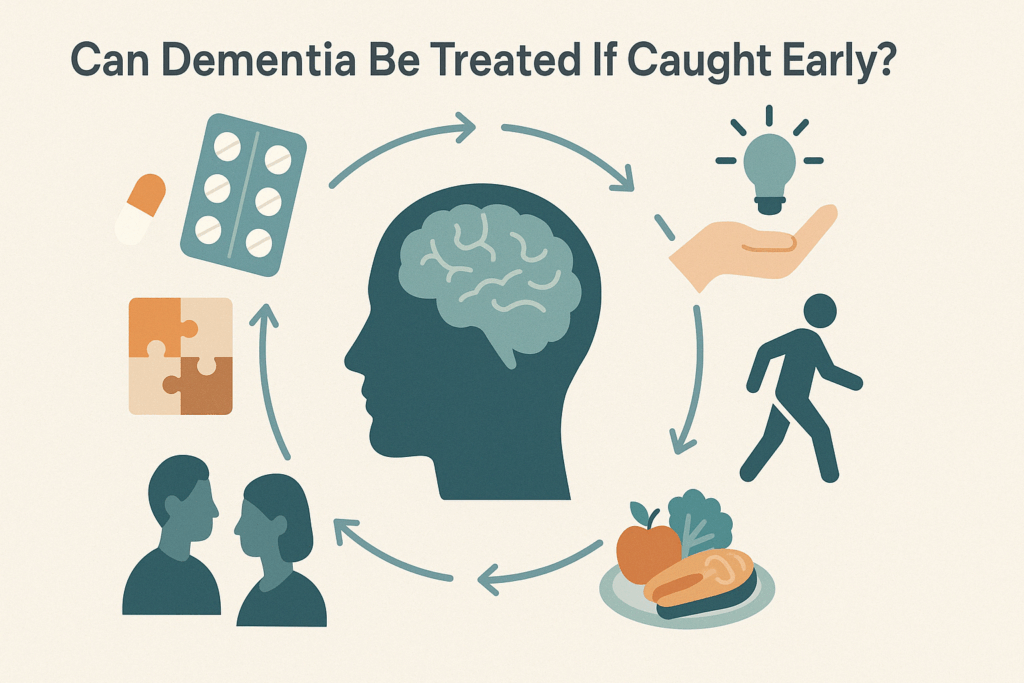
Can Dementia Be Treated If Caught Early?
Many families understandably ask, can dementia be treated if caught early? The answer is nuanced. While most types of dementia, including Alzheimer’s disease, currently have no cure, early diagnosis opens the door to meaningful interventions. Medications such as cholinesterase inhibitors and NMDA receptor antagonists can help manage symptoms and slow cognitive decline. Moreover, early-stage interventions can significantly improve quality of life.
Non-pharmacological approaches are equally important. Cognitive stimulation therapy, lifestyle modifications, and support groups can all contribute to better outcomes. Understanding how to diagnose dementia early gives patients and their families more time to plan, make legal and financial decisions, and engage in meaningful activities. Early treatment may also help delay institutionalization and reduce caregiver burden.
How to Navigate the Healthcare System for a Dementia Diagnosis
Securing a diagnosis for dementia requires persistence, organization, and communication. Knowing what doctor treats dementia based on your unique symptoms and circumstances can streamline the process. Start by documenting all noticeable changes in behavior, memory, or functioning, including dates and examples. Bring this information to a primary care visit and ask for a referral to a specialist.
Insurance coverage, geographic location, and provider availability may influence who diagnoses dementia in a given case. In rural or underserved areas, telemedicine and academic medical centers may offer specialized services remotely. Being proactive, asking questions, and advocating for comprehensive evaluation are essential components of getting a timely and accurate diagnosis.
Support Systems and Long-Term Care Planning
Once a diagnosis is made, attention shifts to care planning and support. Understanding how to get a dementia diagnosis is only the first step in a long journey. Families must navigate medication management, daily care needs, legal planning, and emotional support. Multidisciplinary teams that include social workers, care managers, and occupational therapists can be invaluable.
Community resources, such as Alzheimer’s associations and local aging services, often provide education, respite care, and counseling. Knowing what kind of doctor treats dementia can also guide long-term care coordination, ensuring continuity across transitions in health status or care settings. Planning ahead allows families to preserve autonomy and ensure that the individual with dementia receives compassionate, person-centered care.
The Complexity of Diagnosing Dementia in the Elderly
Older adults often present with overlapping health issues, which can complicate the diagnostic picture. Conditions such as hearing loss, vision impairment, medication side effects, and depression can all mimic or exacerbate dementia symptoms. Therefore, understanding how is dementia diagnosed in the elderly requires a nuanced approach that takes these variables into account.
Age-related cognitive changes are common, but they do not always signal dementia. Differentiating normal aging from pathological decline demands careful observation, repeated assessments, and interdisciplinary collaboration. For this reason, geriatricians and geriatric psychiatrists are often preferred for elderly individuals, as they bring both medical expertise and a sensitivity to the challenges of aging.
Conclusion: How to Detect Dementia and Find the Right Doctor for a Trusted Diagnosis
Navigating the path to a dementia diagnosis can feel overwhelming, but understanding how to detect dementia and identifying the right type of dementia doctor can transform the experience from one of confusion to one of clarity and direction. Whether symptoms are just beginning to surface or have already progressed, knowing who can diagnose dementia allows families to act decisively and compassionately. The diagnostic journey often begins with a primary care physician and expands to include specialists such as neurologists, geriatricians, psychiatrists, and neuropsychologists. Each professional offers unique insights that contribute to a comprehensive understanding of the patient’s condition.
Importantly, knowing how to diagnose dementia early provides a crucial window for interventions that can enhance quality of life and slow disease progression. The process of dementia diagnosis is not a single event but an evolving clinical conversation, one that integrates medical history, behavioral patterns, cognitive testing, and collaboration between medical disciplines. Asking the right questions—such as what doctor diagnoses dementia or how do you get diagnosed with dementia—opens doors to timely care, informed decisions, and meaningful support.
Ultimately, the goal is not just a diagnosis but a roadmap for compassionate, person-centered care. By understanding what kind of doctor treats dementia and how the diagnostic process unfolds, patients and their families are empowered to seek help, plan for the future, and live with dignity in the face of cognitive decline.
Was this article helpful? Don’t let it stop with you. Share it right now with someone who needs to see it—whether it’s a friend, a colleague, or your whole network. And if staying ahead on this topic matters to you, subscribe to this publication for the most up-to-date information. You’ll get the latest insights delivered straight to you—no searching, no missing out.
Further Reading:
What Is Dementia? Symptoms, Types, and Diagnosis
What Kinds of Doctors Treat Dementia? Learn Your Options
Disclaimer
The information contained in this article is provided for general informational purposes only and is not intended to serve as medical, legal, or professional advice. While Health11News strives to present accurate, up-to-date, and reliable content, no warranty or guarantee, expressed or implied, is made regarding the completeness, accuracy, or adequacy of the information provided. Readers are strongly advised to seek the guidance of a qualified healthcare provider or other relevant professionals before acting on any information contained in this article. Health11News, its authors, editors, and contributors expressly disclaim any liability for any damages, losses, or consequences arising directly or indirectly from the use, interpretation, or reliance on any information presented herein. The views and opinions expressed in this article are those of the author(s) and do not necessarily reflect the official policies or positions of Health11News.

